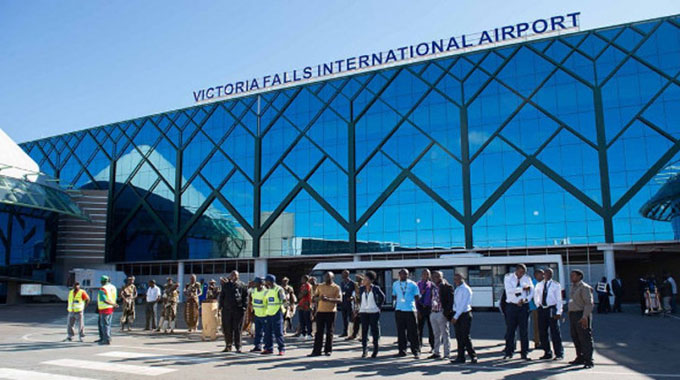EDITORIAL COMMENT : Vic Falls shows how Govt, business can cooperate

The decision by Government to reopen the Victoria Falls and Kazangula border posts to vaccinated tourists shows what active cooperation between business, communities and Government can achieve.
The tourism industry has suffered severely from Covid-19 and while the rest of the economy has coped and will be expanding this year, the tourism and hospitality sectors are seen as dangerous potential nodes of infection.
They bring people together, they not only allow foreign visitors, but encourage them, they require travel.
The City of Victoria Falls is, for all practical purposes, a one industry city. It would still exist if there was no major natural wonder, just a bridge, but would be somewhat smaller than Chirundu or Plumtree, a little town to provide a home for immigration and Zimra staff with Hwange as the “big town” where people went for monthly shopping.
Bans on foreign travel, bans on intercity movement, bans on social gatherings hit the city very hard indeed, and even lighter lockdown controls between waves of infection curtailed business severely.
But the people of the city and the businesses that employ them and support them did not just sit and wring their hands. They decided to move forward. As soon as the national vaccination programme against Covid-19 started the tourism industry pushed to have tourism workers counted as essential workers so they could start lining up for their jabs.
And line up they did. The public and private sectors in Victoria Falls worked together to encourage the people of the city to get vaccinated, not just for their own benefit, but for the survival of their community. This worked.
The city became the first centre in Zimbabwe to achieve herd immunity from vaccination, but did not just sit back when it reached that level.
By the start of this week well over 80 percent of the adult population of the Victoria Falls area had been vaccinated and the push is continuing. By now it must be difficult to be an unvaccinated adult in the city, as you are in a very small minority.
Armed with that achievement the business sector in the city, built around hotels and similar services for tourists, was able to make a very good case to the Government and its medical advisors.
The case was built around the fact, confirmed by very low infection rates, that the city was basically safe.
The businesses were not looking at opening to everyone, but only the vaccinated, tourists who in turn would not introduce unacceptable risks of infection.
Even with safe people coming into a safe city, the proposals went further, that all sorts of other health precautions would continue to be observed.
While details are still being worked out we assume that not only will the general masking, sanitising and social distancing rules be observed, but that hotels and other hospitality centres will be required to forgo cocktail parties and space their clients out, keep their premises disinfected and take other sensible precautions.
That will require a lot of cooperation from city residents, all residents, but considering what they have already done together as a community to keep their city alive this should not be impossible.
Public pressure in many ways is more effective than the police in enforcing health guidelines and rules.
A careful and phased re-opening of the tourism industry in Victoria Falls will also help the Government’s medical advisors gather data that will help the decision makers when they come to consider when and how the enhanced lockdown in the rest of Zimbabwe can be modified.
Again this might well be by area, rather than a one-off national set of rules.
Urban centres and rural districts with very high vaccination rates, low infection rates and, most importantly, local communities that are prepared to cooperate fully and enthusiastically should be given more leeway than towns and districts full of people who either do not care or believe the rules, vaccination and precautions are for others, not themselves.
Already the business community around Zimbabwe is starting to follow the Victoria Falls lead. One major company in an essential sector on the outskirts of Harare not only arranged for all staff to be vaccinated, but put up money to ensure teams could be brought in with enough vaccines for staff and the surrounding community. This again showed active public-private co-operation.
Now it has moved a step further and insists that staff coming to work from next week must either produce their vaccination certificate, and they were given every facility to get this free service, or must at their own expense, if they really insist they do not want to be vaccinated, produce a very recent negative test result.
And the required test is not cheap and will probably need to be repeated at frequent intervals. But they can still go off and get their jabs, for free.
This preserves the voluntary nature of vaccination, but also makes it clear that hold-outs cannot expect a free ride relying on the fact that their colleagues are now far safer, and certainly cannot be given a licence to get sick and infect others in the workforce.
The company simply wants to ensure a very safe working environment, was prepared to put up cash and make a lot of detailed arrangements to get this, and now wants to go to the next step and keep potentially sick people away. That is not only legal, but rational.
Many other companies have made the vaccination arrangements, lined up the transport and given staff time off and will be looking very closely at the lead given by this company when it comes to the next steps.
The Second Republic has proved many times it is pro-business and has done its level best, even when faced by a pandemic as serious as Covid-19, to keep as much as the economy as possible functioning as efficiently as possible.
The Victoria Falls decision shows it is, as it says, a listening Government.
So when a business community comes up with a good idea and has backed that with action and made promises it can fulfil, obviously it is prepared to work with that business sector.











Comments